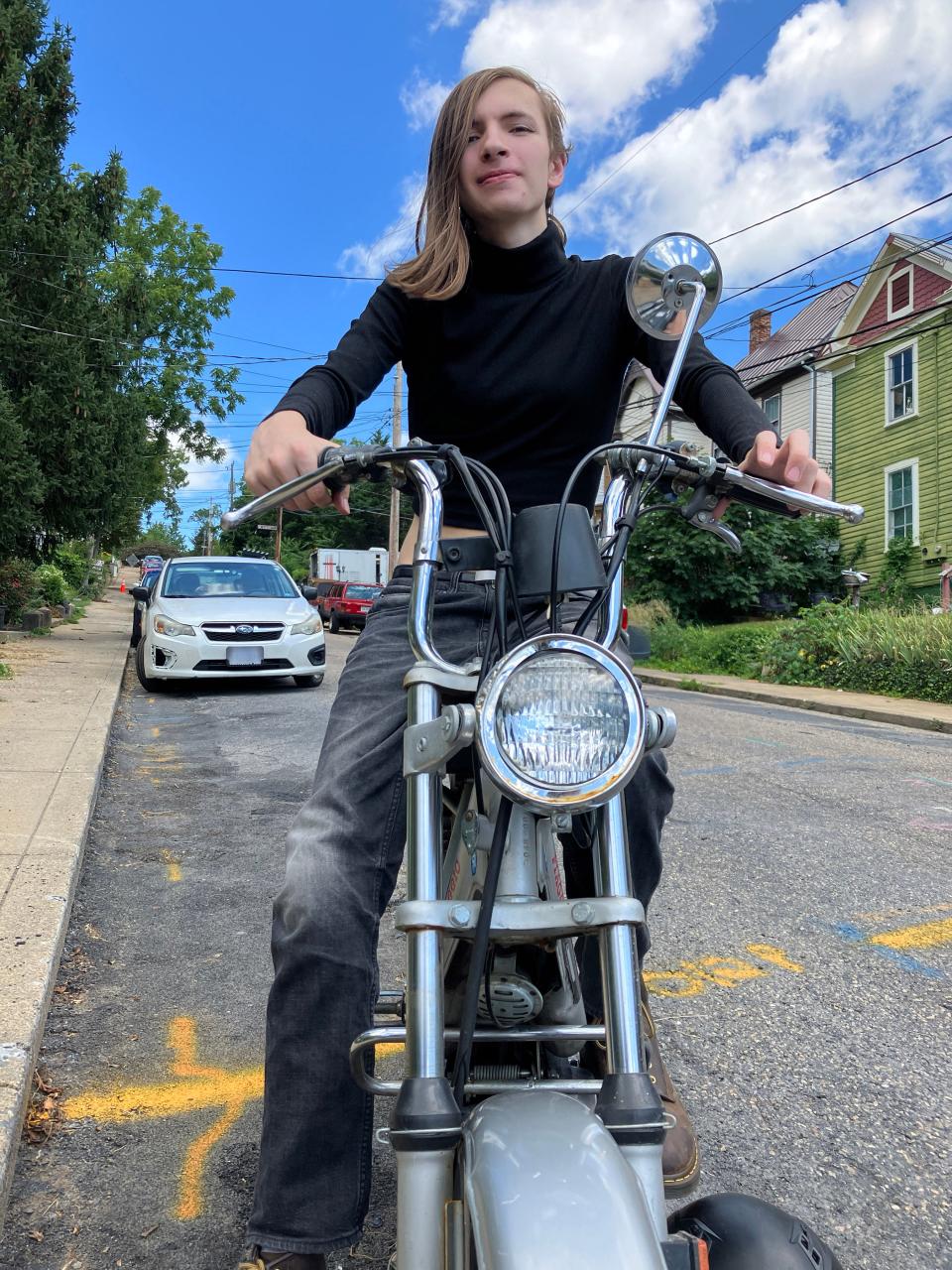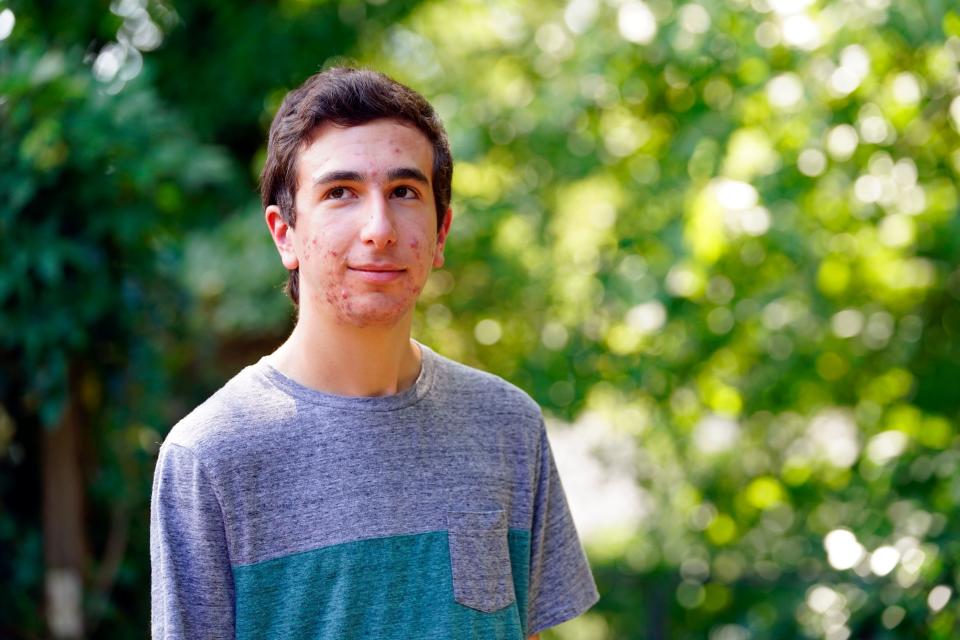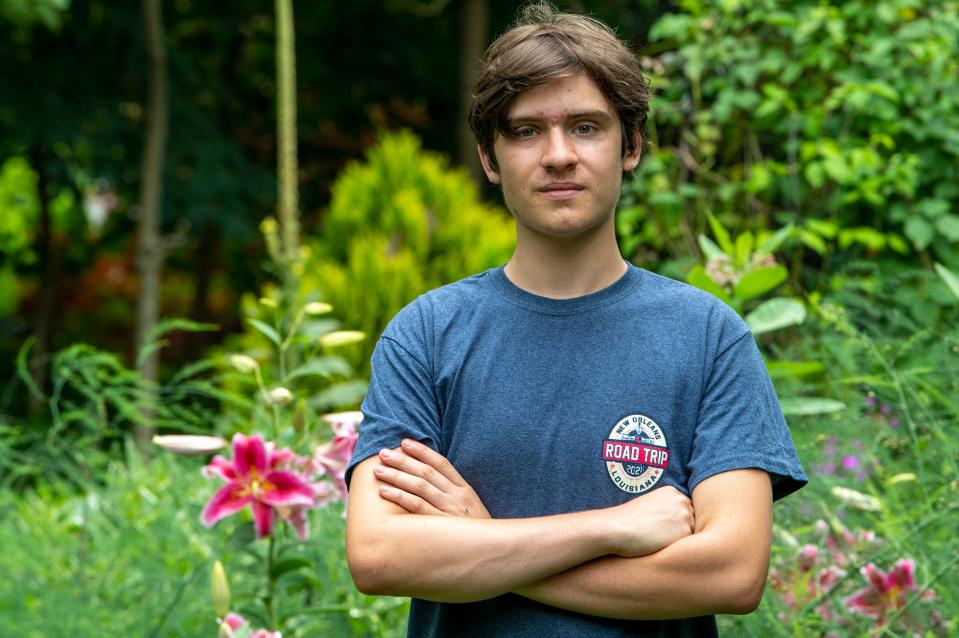Some are students, activists. Some are just worried sick. Climate crisis is all they know.
Older generations are leaving them a planet in crisis, a place of rising seas, heat waves and extreme storms.
They grew up with no assumption that the world they were born into would be the same world when they were adults, never mind a better one. They're seeing the fields their parents used to play on flooding with polluted river water so often they can't enjoy the same games of careless youth.
In response, they're standing knee-deep in marshwater collecting scientific samples to understand how the environment's changing, pursuing new avenues of study like climate justice, getting out the vote as activists, flowing in a sea of human protesters demanding political action.
Or they're sitting in a class as their eyes glaze over, a sense of overwhelming despair making them wonder why they think a college degree will help them fit into a world of constantly diminishing promise, health and safety.
A Pew Research Center study from 2021 found that climate change is a top worry for Gen Z: 76 percent of respondents in that age group said it was one of their biggest societal concerns.
The USA TODAY Network interviewed young people as part of "Perilous Course," a collaborative examination of how people up and down the East Coast are grappling with the climate crisis.
People under 25 spoke to us with clarity, purpose and often with wisdom about the picture that science paints for our future and how they feel about it:
"The companies out there that don't care about the environment, they use money to lobby our government officials."
“It's offensive sometimes, the sheer inaction that we're looking at."
"It’s scary that we have to be the ones to do this."
The overwhelming nature of climate change
Seven-year-old Kervens Blanc was playing with friends behind a two-story concrete building when the ground started shaking. He was scared. He ran.
It was 2010. Haiti was about to become a disaster zone as the earthquake killed tens of thousands of people and destroyed vital infrastructure.
Blanc and his family came to the Boston area shortly after the catastrophe. During years of moving from place to place in and around the city, he grew up with a sense of things being temporary.
That awareness was kicked into a higher gear for the 19-year-old during his senior year at a Boston STEM academy. For his capstone project, Blanc spent hours learning about climate crisis and how natural disasters are and will continue to damage the East Coast.
"I don't like to worry or be too much in fear," he said. "I'm hopeful that something will work out, that we're not going to die because of climate change. But looking at the statistics and the direction we're going in, there's a lot of doubt."


After learning more about the impacts of climate change in school, Blanc feels that educational institutions play a major role in informing people.
For one teen from Staunton, Virginia, her aha moment happened outside of the classroom.
Hyacinth Cox, 18, first discovered a passion for the environment when she attended Nature Camp in western Virginia as a young child. The private, nonprofit summer camp specializes in natural history and environmental science education, focusing on conservation.
Growing up in a family of environmentalists, Cox was always conscious of the world around her, but something about that two-week overnight camp at age 11 changed her.
"Go live in the woods for two weeks, learn about nature," Cox said. "I think that really sparked an interest for me in just how the world functions and grows."
Cox tries to stay as up-to-date as she can on the climate crisis and it can be depressing.
She worries about increased carbon emissions after a recent U.S. Supreme Court decision weakened the Environmental Protection Agency's regulation powers. She is concerned about how devastating heat and severe droughts will threaten the global food supply.
At her worst, she wonders if one day she'll have to move to Canada because the weather in the United States will be too extreme to survive.
"Getting those constant updates just broke me down a bit," she said.
Cox had to learn how to disengage, take time to reset her emotions and try not to stress herself. Therapy helped. When the feelings start to overwhelm her, she works to refocus on what she can change and not worry about what she can't.
"I try not to let it consume my every waking thought because, if I do, that's just not going to be great for my mental health," she said. "But it definitely does upset me a lot, that it's happening and not enough is being done."
This is your brain on climate anxiety
Sarah Jaquette Ray, author of the book, "A Field Guide to Climate Anxiety," and a professor of environmental studies at Humboldt State University, wants you to know you're not alone if you're feeling climate anxiety.
In fact, "climate denial and skepticism can be understood as a kind of climate anxiety," she said. In a culture that is "hostile to uncomfortable emotions, we need to get more comfortable around uncomfortable feelings."
Emotional distance from the impacts of the climate crisis are a normal response. When it becomes hard to shield yourself from all the facts, a sense of doom can replace that distance.
The constant exposure to news that puts a person in fear generates what neuroscientists call "amygdala hijack." The brain is in a constant state of dysregulation, which makes it hard to get from a threatening point A to some more safe point B in the future.
"It is actually very, very terrible for our mental and physical health. It has physical health consequences, which also trigger more mental health consequences," becoming a harsh feedback loop.
"It's not what the planet needs us to have to be able to engage for the long term effectively," Ray said. And this generation feels like they have to fix things themselves.
In a first-of-its-kind global survey of young people published last September, led by academics from the University of Bath in the U.K. and the Stanford Center for Innovation in Global Health, many of the 10,000 respondents — ages 16-25 from 10 countries — said the perceived inadequate government response is associated with feelings of betrayal.
Many feel angry that they are inheriting the inaction of past generations. They blame capitalist power structures for the world's plight. They also feel a measure of hope as awareness grows about the causes of global warming.
“It’s scary that we have to be the ones to do this,” said Jack Thompson, a 17-year-old from Delaware who volunteers for Fridays For Future.
As a legislative liaison to the international climate activism group, he connects with other chapters and d with lawmakers and speaks at the state house in Dover, working on anything from raising fines on polluters to a dream proposal for carbon tax legislation in Delaware.
Thompson admitted to frustration but, like others of his age, he’s channeling his emotions into action.
“It's offensive sometimes, the sheer inaction that we're looking at. You have to figure out how to take that in stride,” said Thompson, about to start his senior year of high school. “The more people we bring out to events, bring out to committee hearings and floor speeches, the more that we can share that: ‘Hey, we're pissed off, too.’”

Matthew Kaufman's neighborhood softball field in River Edge, New Jersey, floods all the time. The 19-year-old student at The College of New Jersey said, “Whenever it floods, they have to shut it down for a few weeks because they have to decontaminate it due to whatever is in the water could be dangerous."
Kaufman said the city council and mayor discussed it recently but had no solution. "The mayor was saying that if climate patterns continue, and it keeps flooding the way it has been, within 10 years we may just have to completely abandon that field.”
“This is the planet and the country we have to inherit," Thompson said. "We have to work to preserve both at the same time."
With awareness of climate change comes equity concern
Tyler Spangler, a 15-year-old from Red Lion, Pennsylvania, said that businesses need to be given time to adapt. He’s cautious about assigning blame. Industries grew and evolved in the 20th century before Americans were aware of the impact of fossil fuels, he said.
“I just think our technology was advancing so fast that they couldn’t keep up with certain aspects of it,” Spangler said.
Others aren’t so forgiving when it comes to industrial development. Kervens Blanc assigns the most blame for the state of the world to capitalism.
"The companies out there that don't care about the environment, they use money to lobby our government officials," he said.
“There seems to be a lot of ‘greenwashing’ going on, where they want a pat on the back for doing a feel-good thing without actually doing much,” said recent North Carolina high school grad Nicky Coursey.
New Jersey activist Pooja Rayapaneni, 17, said the Black Lives Matter protests that rocked the nation during the pandemic and understanding his privilege was what made him aware of the interconnectedness between racism and climate change.
“I was really sparked into... recognizing the privilege I hold living in Bergen County and living in the United States and not really recognizing that a lot of marginalized communities are facing many crises including climate change,” he said.


Saniyah Bolton sees minorities, particularly low-income minorities, as the most vulnerable in the face of climate change. And time is running out to help them.
Bolton, 16, is part of a local Black Lives Matter chapter that her mother co-founded in New Hampshire after George Floyd's murder. She is particularly interested in how climate change, the environment and racism are intimately connected.
"Black people are more likely to have asthma and breathing problems," said Bolton, the co-director of the chapter's youth division. "Gas emissions and air quality, that’s a huge thing.
"It’s a known thing in the U.S. that how our systems are set up, it’s going to benefit the people at the top while the lower class is just getting lower and lower."
She directs her anger towards the "billionaires and companies."
"Why don’t we take some of (your money)," she said, "and put it into community gardens, composting areas, plant-based utensils, and services in school systems to learn more about climate change?"
'The planet does not need us to burn out'
"The climate movement needs all the people in all the places," author Sarah Ray said. While she said the economy continues to shift toward green jobs, she emphasized that "every job is a climate job" for this generation. "Find your superpower and devote that to aspects of climate justice."
She said people experiencing climate anxiety can try to consciously take a pause between the stimuli of bad news and the individual response. "The planet does not need us to burn out," she said.
Like Thompson, the 17-year-old with Fridays For Future in Delaware, many young people are turning to activism.
Coursey has taken her environmental passion from the classroom to the real world, from helping plant trees in Wilmington’s urban hot spots to promoting rain barrels in her community.
Now she has her eye on earning an environmental studies degree from UNC and eventually a career with the U.S. Environmental Protection Agency, “because education and small-town initiatives can only go so far, so policy changes are really the way to go.”
Bolton channels her activism into speaking at climate protests, a platform she uses to lift up the experiences of people of color. She hopes to attend an historically Black college or university once she graduates.
Staunton teen Cox has worked to clean up Lewis Creek and protested the Atlantic Coast Pipeline project. She insists on riding her 25-mph moped everywhere, hoping that her fuel-efficient vehicle is lessening her carbon footprint.
This fall, she will be entering Warren Wilson College in North Carolina, a small liberal arts school that follows sustainable agricultural practices, where she plans to major in conservation biology. She has dreams of becoming a science journalist.
The Haitian native Blanc plans to major in entrepreneurship at Fitchburg State University in Massachusetts when he starts his first semester in the fall. But that didn't feel like enough, he said, so he wants to add a double major in marketing.
"Right now I'm going a little big," he said, smiling.
No matter the career path he takes, whether he finds himself in a position of power or not, Blanc said he will stay involved. "I definitely plan on advocating for minorities and environmental issues. This is our planet. No amount of money could be worth more."
Alex Kuffner is the veteran environment reporter for The Providence Journal, with decades of experience and a deep focus on science reporting. He can be reached at akuffner@providencejournal.com.
Joyce Chu, an award-winning investigative journalist, is the social justice watchdog reporter for The Progress Index in Petersburg, Virginia. Contact her at Jchu1@gannett.com or on Twitter @joyce_speaks.
Journalists from more than 35 newsrooms from New Hampshire to Florida spoke with regular people about real-life impacts for "Perilous Course," digging into the science and investigating government response, or lack of it.
This article originally appeared on The Providence Journal: Gen Z has anxiety about climate change and are using it to take action

